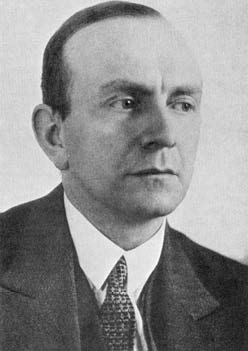Eugen Kolisko

Eugen Kolisko (* 21 March 1893 in Vienna; † 29 November 1939 in London) was an Austrian anthroposophist, physician and Waldorf teacher.
Life
Eugen Kolisko grew up in a Viennese family of doctors. Through his school friend Walter Johannes Stein he became acquainted with anthroposophy at an early age: he first heard Rudolf Steiner's lectures in 1914 and became a member of the Anthroposophical Society. In 1917 he completed his medical studies and became a lecturer in medicinal chemistry at the University of Vienna.
In 1920 he was engaged by Emil Molt as a teacher and school doctor at the newly founded Stuttgart Waldorf School. In addition, he was active, mostly together with his wife Lili (1889-1976), as a collaborator in various anthroposophical specialist courses, and from 1924 with Ita Wegman in the Medical Section at the Goetheanum. His wife Lili is regarded as the founder of the so-called «Steigbildmethode» (capillary dynamolysis), a procedure of the image forming methods of anthroposophy. Eugen Kolisko was particularly involved in the development of various artistic therapies such as eurythmy therapy, anthroposophical music therapy and healing singing (according to Werbeck-Svärdström).
The disputes following Steiner's death led to his dismissal from the Stuttgart Waldorf School in 1934 and his separation from the Anthroposophical Society in 1935. In 1936 he emigrated to England where he wanted to found an anthroposophical university.
Eugen Kolisko died in his 47th year during a train journey to London.
Works
- Das Wesen und die Behandlung der Maul- und Klauenseuche, Arlesheim o.J.
- New edition with an introduction by Peter Selg: Verlag am Goetheanum, Dornach 2001, ISBN 3-7235-1116-3
- Österreich und die Dreigliederung des sozialen Organismus, in: Soziale Zukunft. Der Weg zum Staat, Stuttgart 1921
- Hypothesenfreie Chemie im Sinne der Geisteswissenschaft, in: Anthroposophische Hochschulkurse, Bände I/II, Stuttgart 1922
- Neue Wege in der Pathologie und Therapie durch Anthroposophie. Lecture given on 26 May 1922 at the Society of Physicians in Vienna. Selbstverlag, Wien 1922
- Gedanken zur anthroposophischen Tierkunde, in: Gäa Sophia, Band I, Dornach 1926
- The Human Organism in the Light of Anthroposophy, London 1927
- Medical Work in Education, London 1929
- Die zwölf Gruppen des Tierkreises, in: Gäa Sophia, Band V, Stuttgart 1930
- Vom ersten Unterricht in der Chemie, Stuttgart 1932
- Von Goethes Naturanschauung zur Anthroposophie. Privatdruck, Stuttgart 1932
- Three Fundamental Problems of the Anthroposophical Knowledge of Man
- Neuausgabe als: Threefold Human Organism. UK Kolisko Archive, Bournemouth 1977
- Reincarnation and other Essays, London 1940
- Man’s Connection with the Whole Universe, Wynstones 1943
- Zoology for Everybody, 2 Bände, Brookthorpe 1944
- Geology, Bournemouth 1945
- Agriculture of Tomorrow (with Lili Kolisko), Gloucester 1945 download
- deutsch: Die Landwirtschaft der Zukunft, Schaffhausen 1953 download
- Lead and the Human Organism, Bournemouth 1980
- Auf der Suche nach neuen Wahrheiten. Goetheanistische Studien, mit Erinnerungen aus dem Freundeskreis, hg. v. Gisbert Husemann. Verlag am Goetheanum (Pioniere der Anthroposophie 7), Dornach 1989
- Die Mission des englischsprachigen Westens. Biographische Porträts und andere späte Betrachtungen, hg. v. Andreas Bracher. Perseus Verlag, Basel 2002, ISBN 3-907564-55-3
- Vom therapeutischen Charakter der Waldorfschule. Aufsätze und Vorträge, hg. v. Peter Selg. Verlag am Goetheanum, Dornach 2002, ISBN 3-7235-1153-8
Literature
- Eugen Kolisko, Martin Rozumek (Hrsg.): Hypothesenfreie Chemie. «Hypothesenfreie Chemie» im Sinne der Geisteswissenschaft, der Atomismusstreit 1922/23 und Rudolf Steiners Stellung zum Atomismus, Verlag am Goetheanum, Dornach 2012, ISBN 978-3-7235-1480-1
- Lili Kolisko: Eugen Kolisko. Ein Lebensbild. Selbstverlag, Edge near Stroud/Gerabronn 1961
- Eberhard Schickler (et al.): Eugen Kolisko. Bilder aus seinem Leben und Wirken
- Peter Selg (Hg.): Eugen Kolisko in: Anthroposophische Ärzte. Lebens- und Arbeitswege im 20. Jahrhundert. Nachrufe und Kurzbiographien. Verlag am Goetheanum, Dornach 2000, ISBN 3-7235-1069-8
- Peter Selg: Anfänge anthroposophischer Heilkunst. Ita Wegman, Friedrich Husemann, Eugen Kolisko, Frederik Willem Zeylmans van Emmichoven, Karl König, Gerhard Kienle. Verlag am Goetheanum (Pioniere der Anthroposophie 18), Dornach 2000, ISBN 3-7235-1088-4
Weblinks
- Biographical Entry in the online documentation of the anthroposophical Forschungsstelle Kulturimpuls
- Eugen-Kolisko-Akademie, Educational institution for anthroposophical medicine in in Filderstadt
- In the Soil And Health Library you can find, among many other works on the subject, Eugen and Lili Kolisko's Agriculture of Tomorrow for download www.soilandhealth.org.
- Kolisko Archive - Works by Eugen and Lili Kolisko
| This article is partly based on the article Eugen Kolisko from the free encyclopedia de.wikipedia and is licensed under Creative Commons Attribution/Share Alike. Wikipedia has a list of authors available. |
